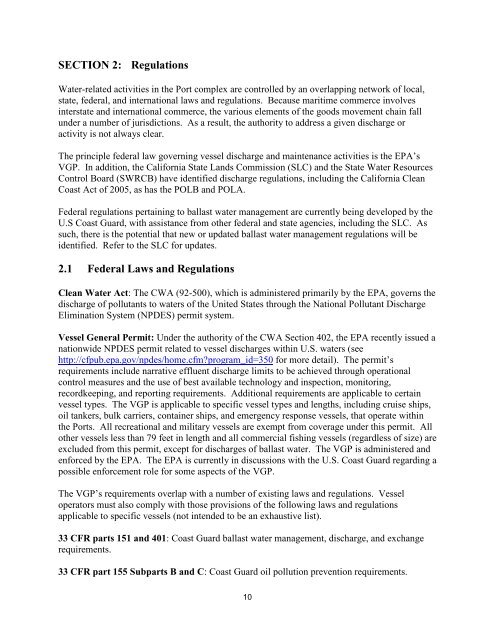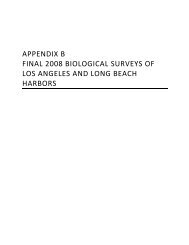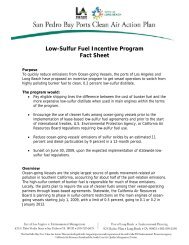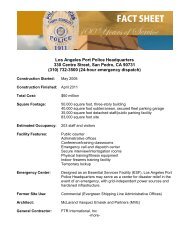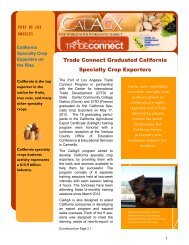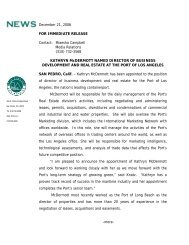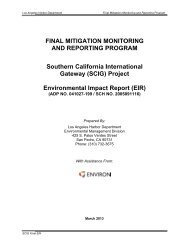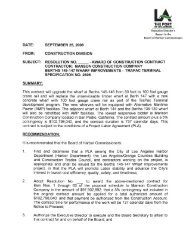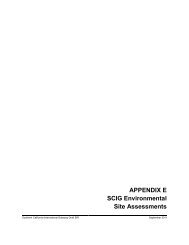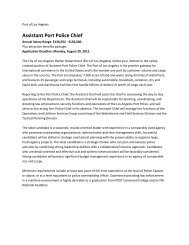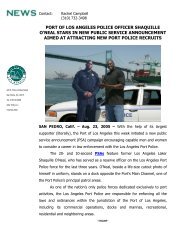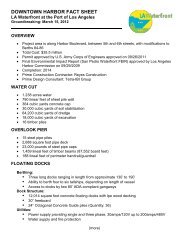Vessel Discharge Rules and Regulations - The Port of Los Angeles
Vessel Discharge Rules and Regulations - The Port of Los Angeles
Vessel Discharge Rules and Regulations - The Port of Los Angeles
You also want an ePaper? Increase the reach of your titles
YUMPU automatically turns print PDFs into web optimized ePapers that Google loves.
SECTION 2: <strong>Regulations</strong><br />
Water-related activities in the <strong>Port</strong> complex are controlled by an overlapping network <strong>of</strong> local,<br />
state, federal, <strong>and</strong> international laws <strong>and</strong> regulations. Because maritime commerce involves<br />
interstate <strong>and</strong> international commerce, the various elements <strong>of</strong> the goods movement chain fall<br />
under a number <strong>of</strong> jurisdictions. As a result, the authority to address a given discharge or<br />
activity is not always clear.<br />
<strong>The</strong> principle federal law governing vessel discharge <strong>and</strong> maintenance activities is the EPA’s<br />
VGP. In addition, the California State L<strong>and</strong>s Commission (SLC) <strong>and</strong> the State Water Resources<br />
Control Board (SWRCB) have identified discharge regulations, including the California Clean<br />
Coast Act <strong>of</strong> 2005, as has the POLB <strong>and</strong> POLA.<br />
Federal regulations pertaining to ballast water management are currently being developed by the<br />
U.S Coast Guard, with assistance from other federal <strong>and</strong> state agencies, including the SLC. As<br />
such, there is the potential that new or updated ballast water management regulations will be<br />
identified. Refer to the SLC for updates.<br />
2.1 Federal Laws <strong>and</strong> <strong>Regulations</strong><br />
Clean Water Act: <strong>The</strong> CWA (92-500), which is administered primarily by the EPA, governs the<br />
discharge <strong>of</strong> pollutants to waters <strong>of</strong> the United States through the National Pollutant <strong>Discharge</strong><br />
Elimination System (NPDES) permit system.<br />
<strong>Vessel</strong> General Permit: Under the authority <strong>of</strong> the CWA Section 402, the EPA recently issued a<br />
nationwide NPDES permit related to vessel discharges within U.S. waters (see<br />
http://cfpub.epa.gov/npdes/home.cfm?program_id=350 for more detail). <strong>The</strong> permit’s<br />
requirements include narrative effluent discharge limits to be achieved through operational<br />
control measures <strong>and</strong> the use <strong>of</strong> best available technology <strong>and</strong> inspection, monitoring,<br />
recordkeeping, <strong>and</strong> reporting requirements. Additional requirements are applicable to certain<br />
vessel types. <strong>The</strong> VGP is applicable to specific vessel types <strong>and</strong> lengths, including cruise ships,<br />
oil tankers, bulk carriers, container ships, <strong>and</strong> emergency response vessels, that operate within<br />
the <strong>Port</strong>s. All recreational <strong>and</strong> military vessels are exempt from coverage under this permit. All<br />
other vessels less than 79 feet in length <strong>and</strong> all commercial fishing vessels (regardless <strong>of</strong> size) are<br />
excluded from this permit, except for discharges <strong>of</strong> ballast water. <strong>The</strong> VGP is administered <strong>and</strong><br />
enforced by the EPA. <strong>The</strong> EPA is currently in discussions with the U.S. Coast Guard regarding a<br />
possible enforcement role for some aspects <strong>of</strong> the VGP.<br />
<strong>The</strong> VGP’s requirements overlap with a number <strong>of</strong> existing laws <strong>and</strong> regulations. <strong>Vessel</strong><br />
operators must also comply with those provisions <strong>of</strong> the following laws <strong>and</strong> regulations<br />
applicable to specific vessels (not intended to be an exhaustive list).<br />
33 CFR parts 151 <strong>and</strong> 401: Coast Guard ballast water management, discharge, <strong>and</strong> exchange<br />
requirements.<br />
33 CFR part 155 Subparts B <strong>and</strong> C: Coast Guard oil pollution prevention requirements.<br />
10


